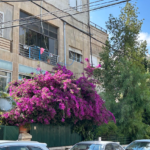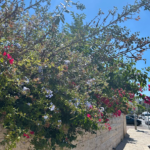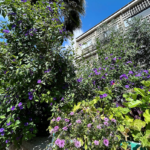I have been living in Jerusalem, Israel, since the beginning of April, and I treasure each day I spend here despite the continual state of war. There are daily reports of battles on the front lines in Gaza in the south and bombs and missiles projected at Israel from Syria and Lebanon in the north.
One of the advantages of living here is the privilege of engaging in in-person Torah study with exceptional teachers almost every day of the week. There are numerous places of learning for men, women, mixed-gender groups, and children of all ages.
It may be difficult for those outside Israel to understand how much our Torah and Torah laws, known as “halacha,” impact every aspect of life in Israel. They influence social interactions, child-rearing, healthcare, agriculture, ecology, governance, and even rules of war. Our sacred text, the Torah, and thousands of preserved rabbinic commentaries over millennia provide guidance on almost every aspect of daily life.
We are about to embark on the Jewish holiday of Shavuot when, according to rabbinic sources, the Jewish people received the Torah at the base of Mount Sinai in the Sinai Desert in 1312 BCE.
Counting of the Omer
The Torah prescribes counting forty-nine days between the seder night of Passover and Shavuot. This practice is known as “Counting the Omer.” Initially, this tradition was connected to the sacrificial offerings in the ancient Jerusalem Temples. In contemporary times, Counting the Omer is associated with a Kabbalistic practice of personal growth, a time of preparation for receiving the Torah. This period coincides with the wheat and barley harvest and with spring in the Holy Land, adding to our joy with the blossoming of fruit trees that line every street. (1)
Pursuing Spiritual Fulfillment
During the seven Sabbaths between Passover and Shavuot, studying the Mishnaic text Pirkei Avot, known in English as the Ethics of the Fathers, is customary.
One of the precepts of Pirkei Avot, Chapter 1, verse 3, states:
“Antigonos of Socho received the tradition from Shimon the Righteous. He would say: Do not be ‘like slaves, who serve their master for the sake of reward,’ rather, be like slaves who serve their master but not for the sake of the reward. And the fear of Heaven should be upon you.” (2)
Rabbi Moshe Snow, Rabbi Emeritus of the Bayit Synagogue in Toronto and currently on the faculty of the OU Teaching Center in Jerusalem, explained this verse based on rabbinic sources. He emphasized that one should study the Torah without seeking earthly rewards. The true and ultimate reward lies in the spiritual blessings derived from Torah study, both in this world and the world to come. If you seek primarily the material reward, you will miss out on the greater reward – the spiritual reward of Torah study.
Weekly Torah Study
The Jerusalem OU publishes a free magazine called Torah Tidbits, featuring articles on the weekly Torah portion. It is distributed widely for free and is also available online. (3)
All-Night Torah Study
Many communities worldwide, including ours, organize all-night Torah study sessions on the night of Shavuot. These sessions, a cornerstone of our faith, conclude at sunrise with a communal prayer service. During this service, we read the Torah portion related to Mount Sinai’s events and recounted the Ten Commandments, reinforcing our connection to our faith and community.
On Shavuot and every day, we are reminded that the strength of our military forces is derived not only from material support, munitions, and armour – which are undeniably crucial. It also comes from the spiritual resources of our soldiers, who are motivated to heroically defend their families and their land with their lives, and the spiritual support of all those who pray for the well-being of our soldiers and their families. Many valiantly support the war effort through various volunteer services and daily observance of Torah commandments/mitzvot. We are commanded to “redeem hostages” as Abraham did by going to war to save his nephew Lot, who had been taken captive, and to “never stand idly by when we see the blood of our brothers.”
In her Shavuot message, Israeli influencer Sivan Rahav-Meir articulates the essence of the festival by stating:
“The festival of Shavuot begins this evening. It represents a much-needed revolution in the form of true unity. We have long known how to unite in the face of a common enemy. On Simchat Torah, last October 7, Sinwar wanted to kill all of us, regardless of our political or religious affiliation, and so we united. An external threat has always increased our sense of mutual responsibility. That’s only logical, but it’s not enough. The festival of Shavuot calls upon us to rise to the next level — that of authentic unity, unity for its own sake. When the Torah was given, we were not running away or hiding from anyone. We did not come together because of Nazis, antisemites, Hezbollah, or Hamas. We simply gathered joyfully at Mount Sinai and there received our identity. We heard the Ten Commandments and declared in unison: “Na’aseh V’nishma” (We will do and we will understand).”
Ultimately, our enduring Jewish unity is rooted in our remarkable shared history and anticipated hopeful future—the Messianic End of Days when ‘the lion will lie down with the lamb’ (Isaiah 11:6)! (4)
I recently attended a class with Rabbi Goldscheider, a faculty member of the OU and formerly of Mount Kisco Synagogue in NY. He shared Rav Kook’s ten ideas about learning on Shavuot night. Some of his insights might surprise you. He suggests studying what truly interests your heart, whether Kabbalah or mystical texts. Additionally, he emphasizes the importance of paying attention to your physical needs and maintaining a healthy body as crucial prerequisites for proper Torah study. You can access his class here.
In the past, I have posted about Shavuot on this site, highlighting the annual renewal of the Jewish people’s commitment to the eternal Ten Commandments, which are the foundation of our national creed and aspirations. (5)
Wishing everyone a hag sameach, a joyous holiday that has the potential to unite all peoples under the Divine Umbrella of Peace and Justice, our Torah.
Footnotes:
- “What Is the Counting of the Omer?” Chabad.org, www.chabad.org/holidays/passover/pesach_cdo/aid/87150/jewish/What-Is-the-Counting-of-the-Omer.htm.
- “Pirkei Avot: The Translated Text, Selected Insights, Audio Classes, and Stories for the Children.” Chabad.org, www.chabad.org/library/article_cdo/aid/282399/jewish/Pirkei-Avot-Ethics-of-the-Fathers.htm.
- Faculty of the OU. “Torah Tidbits: Parshat Bechukotai – Issue 1566 – Individual Articles.” Torah Tidbits, www.torahtidbits.com/parshat-bechukotai-issue-1566-individual-articles.
- Rahav-Meir, Sivan. Daily WhatsApp. Translated by Yehoshua Siskin, tiny.cc/DailyPortion.
- AskAbigail Productions. “Unveiling the Significance of Shavuot.” Blog about Shavuot, 2 June 2022, www.askabigailproductions.com/unveiling-the-significance-of-shavuot.



